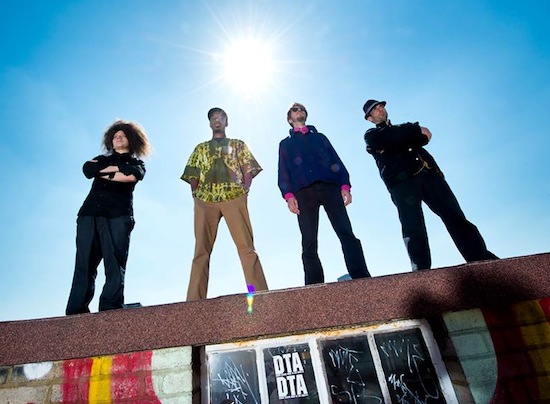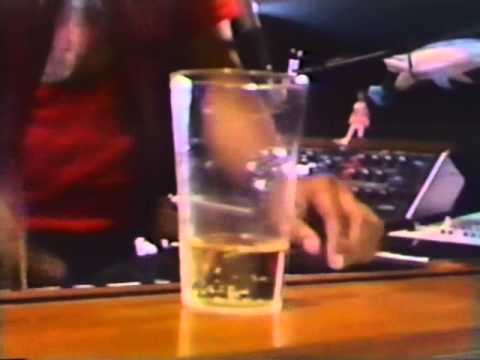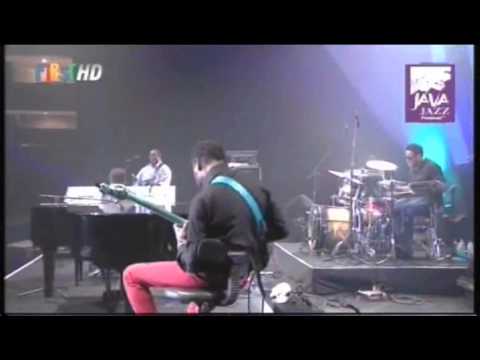There’s a celebratory fever in the air. While The Quietus recently popped champagne (or rather whacked on the kettle) to mark its fifth anniversary, two more landmark birthdays reminded us how revelatory and thrillingly life-affirming experimental music can be: that of legendary ex-Weather Report saxist, Wayne Shorter, who turned 80 on August 25th, and maniacal avant-garde composer and saxist, John Zorn, who turned 60 on September 2nd.
It’s tradition that those celebrating a birthday should receive gifts, not give them. But Shorter and Zorn aren’t exactly the traditional kind. Turning customs on their head, as per, these two exploratory musicians were the ones dishing out the gifts, in the shape of outstanding landmark concerts, to mark their special days.
Although ten years older than rock dinosaur Mick Jagger (Shorter sessioned on The Rolling Stones’s 1997-released Bridges To Babylon) and nine more than croaky ex-Beatle, Paul McCartney, Shorter, as this clip of his 2013 Montreal International Jazz Festival performance shows, is considerably more imaginative, energetic and youthful in spirit than those two aforementioned OAPs combined. Never one to rest of his laurels, the mystic saxist, who as a bandleader and collaborator indelibly seared his trademark free-flowing, bright style on to numerous essential albums down the decades (Miles Davis’ Bitches Brew, Weather Report’s Heavy Weather, Jaco Pastorius’s self-titled solo debut and Art Blakey’s A Night In Tunisia to name but a few), appears to have become more intense and unpredictable with age, as this year’s live-collection Without A Net suggests. 80 not out, with still a lot to give.
Likewise, to put it mildly, New York-based avant-garde jester John Zorn is a saxist and composer who continually pushes boundaries. His 60th commemorations, wildly uncategorisable concerts staged a few months prior to his actual birthday, took in medieval-sounding a cappellas, thrash metal, punk-jazz squalls, string-quartet episodes, cartoonish surf-rock and klezmer – not to mention the kitchen sink. A master of suspense and the ridiculous, Zorn’s mutations of Jewish folk themes, jazz and film soundtracks have been a massive influence on the works of ex-Faith No More and Mr. Bungle frontman Mike Patton, who fittingly contributed typically ferocious vocal performances during the festivities. Intense, cerebral, violent, exhilarating – not your average 60th birthday, then…
Elsewhere – on another, more sombre note – the jazz community celebrated the life of larger-than-life fusion keyboardist, vocalist, composer and producer George Duke, who died on August 5th aged 67.
Duke will be fondly remembered for countless reasons: his shining musicality and infectious sense of melody and rhythm (as one message-board commenter put it: "Heaven’s rhythm section just got funkier"); his evocative and emotional command over synths; his uplifting, gospel-inflected vocal prowess; his midas-touch production techniques; his warm personality and freewheeling humour…the list goes on and on. Although Duke’s vibrant presence graced some of the most colourful and free-spirited records of last century (Frank Zappa’s One Size Fits All and Waka/Jawaka, The Billy Cobham – George Duke Band Live On Tour In Europe, and Duke’s own I Love The Blues, She Heard My Cry and A Brazillian Love Affair are all essential listening), he is also responsible for bringing jazz to a wider audience, notably with his 1977-released pop-orientated LP Reach For It. However, he was righteously unrepentant about making music accessible: "I really think it is possible to make good music and be commercial at the same time. I believe it is the artist’s responsibility to take the music to the people. Art for art’s sake is nice; but if art doesn’t communicate, then its worth is negated, it has not fulfilled its destiny."
Let the good times roll…
Magnus Ostrom – Searching For Jupiter
(ACT)
The boldest statement on swedish drummer Magnus Ostrom’s last album, Thread Of Life, was found staring out from the front cover: stripped to the waist, flexing his pecs, Ostrom looked more like a rock bruiser than a sober jazz sophisticate. Sadly, though, the music therein was much less striking. An elegy to his former band mate and childhood friend, Esbjorn Svensson (whose untimely death due to a diving accident in 2008 rocked the jazz community), the ambient-influenced album of pulsing electric jazz tended to stray into milky, coffee-table territory.
Ostrom returns with Searching For Jupiter, which, while still heavily weighted with the loss of Svensson, is a more spirited, freer transaction. Having not played with anyone else outside his former outfit, Esbjorn Svensson Trio (EST), for 15 years, Ostrom has now not only developed a strong rapport with his young, talented bandmates, but also sharpened his own compositional skills, evident on the rippling-with-riffs title-track and centrepiece, built around pianist Daniel Karlsson’s snaking, thundering left-hand motif.
Progressive tendencies still abound; but, despite what the press release claims, this is less Pink Floyd, more spacey-textured post-rock. Though the influence of fusioneer Pat Metheny, who appeared on the stunning ‘Ballad For E’ on Ostrom’s last album, is most strongly felt, especially on the floaty, folk-but-not-folk vibes of ‘Through The Sun’ and ‘Happy And The Fall’.
Joachim Kuhn – Voodoo Sense
(ACT)
Voodoo Sense is a fitting title for this dark, intense and bewitching set of ‘world-jazz’ compositions. From the outset, the album is replete with obscure and unsettling happenings, like the grave intonations on the reworking of John Coltrane’s classic, ‘Kulu Se Mama,’ which sound like they’re uttered by the dwarf who speaks backwards in Twin Peaks; or, elsewhere on the same track, Joachim Kuhn’s erratic piano outpourings, suggestive of a man possessed, or
someone on the verge of an anxiety attack.
Kuhn, Germany’s celebrated jazz elder statesman, is widely known for his journeying spirit. In the 1960’s, he was one of the few europeans to migrate to America to jump on the ‘New Thing’ wave led by the free-spirited voice of John Coltrane. Even today, at the ripe age of 69, Kuhn’s bent for uniting nations, traditions and sounds has not diminished: On Voodoo Sense he brings together the talents of Morrocan guembri virtuoso and vocalist Majid Bekkas, the Spanish drummer Ramon Lopez and an array of young African percussionists, not to mention American saxophonist Archie Shepp, also an acolyte of Coltrane, with whom he teamed up on the drone-y romanticism of 2011’s ‘Wo!Man.’
As the title suggests, the album largely deploys voodoo-inspired dance rituals, like on the call-response-centred ‘Gbalele,’ with its cantering, pack-horse percussion ridden by Kuhn’s mellifluous harmonies. Nothing here however outstrips the fittingly-titled ‘Firehorse;’ its racing rhythms, punchy bass runs and darting right-hand piano lines are simply breathtaking.
Blue Touch Paper – Drawing Breath
(Provocateur Records)
Anglo-German outfit Blue Touch Paper’s bandleader Colin Towns boasts a
voluminous, wide-ranging CV that, if printed out, probably wouldn’t be far off Jack Kerouac’s 120-ft On The Road scroll. Towns is a prolific composer, arranger, performer and bandleader best known for his soundtracking work on – yes, that’s right – a Doc Martin TV series, a raft of films (The Wolves Of Willoughby Chase, The Puppet Masters and Essex Boys) and, more recently, his excellent big-band tribute projects (Visions Of Miles – The Electric Period Of Miles Davis and John Lennon – In My Own Write). Though in Blue Touch Paper, a more fitting title for Towns would be ringleader, due to his outfit’s
eccentric, circus-inspired adventurism.
As you might expect from an album led by a man with his finger in many pies, Drawing Breath is packed to the rafters with ideas: Miles Davis-sounding fusion, Latin-dance, film-noir textures, Brit jazz via Bill Bruford and Andy Sheppard and prog rock are juggled wildly throughout, all often in the course of one track, like on the King Crimson-sounding ‘The Joke’ and the tango-goes-rock ‘Suddenly A Tango.’ The album’s star craftsmen include Polar Bear saxophonist Martin Lockheart and Troyka guitarist Chris Montague, both of whom perform daredevil feats of imagination from first to last.
Sons of Kemet – Burn
(Naim Jazz)
Sons Of Kemet are the pensive Dr. Jekyll’s vis-a-vis their dark, fiery Mr. Hyde alter-ego, Melt Yourself Down. Featuring MYD’s Barbados-raised saxist-clarinetist Shabaka Hutchings and the drum tag-team powerhouse that is Tom Skinner and Sebastian Rochford, not to mention tuba virtuoso Oren Marshall, this melting-pot supergroup, who meld Rastafarian rhythms, middle-east and west-African melodies and straight-up rock energy, can ignite a dance floor just as fiercely as MYD, but also temper their deranged, freewheeling energy with spacious, reflective and poetic episodes.
Burn is not only a searing statement of intent (their live shows to date have proven to be thrilling affairs), but a vehicle for Hutchings’ bent for activist politics and literature. Similarly to Fernando Pessoa’s existential journal of the same name, ‘The Book Of Disquiet’ is dark, disjointed and seductively meandering; the fist-pumping ‘All Will Surely Burn,’ on whose coda Hutchings wails out in impotent rage, riffs on the theme of global warming.
Unlike some of their peers, Sons Of Kemet can move from melodic maelstroms to moving meditations in a moment. Driven by Marshall’s droning tuba riffs, the drivingly hypnotic ‘Going Home’ gives way to probably one of the most beautiful and haunting ballads in any genre this year, ‘Adiona’s Lullaby.’
Kentyah Presents: M1, Brian Jackson and The New Midnight Band
Jazz Cafe, Camden, September 9th 2013
Hip-hop was a dirty word for the late revolutionary jazz-poet Gil Scott Heron. Yet, although the Chicago-born, self-labelled ‘bluesologist’ famously repudiated his ‘Godfather Of Rap’ tag, he undeniably set the stage for hip-hop upstarts including Public Enemy, Talib Kweli and New York-based duo Dead Prez, one half of whom (M1) fronts tonight’s line-up of The New Midnight Band, a contemporary recasting of Scott-Heron and legendary keyboardist ally Brian Jackson’s socially-conscious vision.
Also featuring DJ and producer Kentyah,ex-Herbie Hancock drummer Mike Clark, hard-grooving bassist Reggie Washington and Brian Jackson himself, the rap-friendly outfit’s mission statement is well meaning: to pass on to a modern audience Scott-Heron’s bristling tradition of informing masses through politically driven music. But sadly the band, despite the jazz pedigree among its ranks, are too pedestrian to make a hard-hitting impact.
Their bloodlessness can be attributed to a number of factors: jazz elder statesmen Jackson and Clark seemed zonked after having just rolled in after a 14 hour flight from Oakland; the Dead Prez rapper’s performance is largely venomless and dull, and it often detracts attention away from the band’s more spirited jams; and, from the side of the stage, Kentyah, who does little more than trigger rabble-rousing soundbites of the likes of Black Panther Bobby Seale, takes on the role of conductor, but often, unwittingly, suppresses the band just before they seem to be lighting a fire under a groove.
Nevertheless, when the band is given room to breathe, they fire off snatches of neo-soul scintillation. A low-slung, funky reworking of junk-ballad ‘Home Is Where The Hatred Is’ morphs into a hard-rocking jam driven by Clark’s swinging rhythm diversions. And anti-drinking narrative ‘The Bottle’s’ intoxicating chorus is still an emotional gut punch that leaves you reeling.





